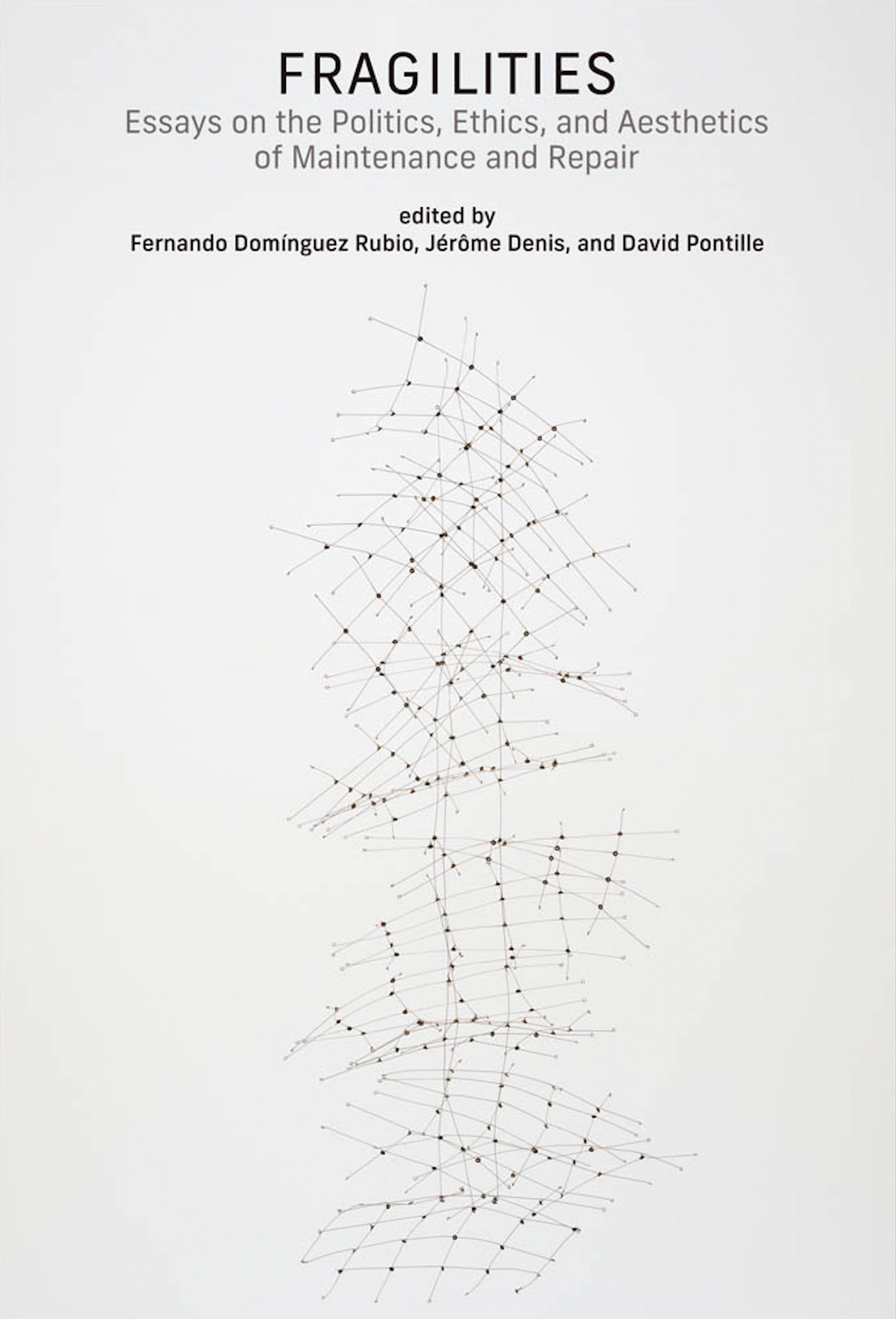Together with my colleague Vincent Duclos, during the pandemic we were invited to contribute to the thrilling book project Fragilities: Essays on the Politics, Ethics, and Aesthetics of Maintenance and Repair, compiled by Fernando Domínguez Rubio, Jérôme Denis and David Pontille.

The book features the work of many researchers who have been for a very long time a great inspiration to think of care and care practices in STS and beyond. As the editors position the book, this is:
An original essay collection that explores the generative dimensions of fragility, which can help reveal new life-affirming politics and ethics.
At a time when it may be easy to fall into a defeatist melancholia, if not outright pessimism, fragility offers an opportunity for a different kind of world-making. In Fragilities, Fernando Domínguez Rubio, Jérôme Denis, and David Pontille argue that we need to pay attention to the moments when the bodies, things, and worlds we inhabit begin to crack and reveal their fragility; it is in these instabilities that we can gain precious access to alternative ways of being. The essays in this collection explore how the work of care, maintenance, and repair compose with, rather than struggle against, fragilities.
Fragility forces us to reckon with the precariousness and contingency of life and to use this reckoning as a starting point to build and nurture life-affirming politics and ethics. The book explores fragility in four categories—bodies, environments, labor, and politics—and proposes to consider in each situation what/who is rendered visible, what/who is made absent, what is considered normal, and what is deemed strong and stable versus what is deemed fragile. The volume includes a strong line-up of leading and emerging scholars from a wide array of disciplines, including anthropology, social studies of science, disabilities studies, and sociology.
As the editors powerfully discuss in the conclusions, ‘fragility’ might operate less as a closed analytic and more as a ‘sensitising device’, a provocation of whose effects we need to take care of when deploying it in our analyses:
“No object or living being is fragile in itself. What matters is when, why, and by whom it is considered and treated as fragile: through which mode of attention, by which gestures and instruments, according to which collectives, in which situation, and among which interdependencies.” (p. 253)
“Resisting reductionism and cultivating discomfort are two crucial perceptual, affective, and conceptual operations that thinking with fragility helps to carry out. Thus, as a situated, relational, and ambiguous concept, fragility allows us to “stay with the trouble” …It is as much sensitizing and provocative as it is troubling. This dimension of what fragility does is particularly important when the concept is associated with repair, maintenance, and care, as it is in this collection. There is, indeed, a serious risk of romanticizing these practices as if they were intrinsically good and fair … care needs to be unsettled in order to escape reification and conservatism” (p.259)
“As troubling as it may be, thinking with fragility does not lead to paralysis or infinite oscillations. On the contrary, it unfolds the present and its openness and allows us to connect aspects of the past with possible futures that call for action.” (p.260)
***
The book has just appeared not just as a paperback but, as a fully open access e-book, downloadable here.
Thanks for putting this together Fernando, Jerôme and David, what a treat!
***
Our contribution, written at the height of the pandemic, reflected on our fieldwork projects: Vincent’s on MOS@N, a mobile health (mHealth) initiative implemented in Nouna, rural Burkina Faso, and myself’s on the do- it- yourself (DIY) collective En torno a la silla in Barcelona, Spain. Here you have it.
Care in Fragments: Ecologies of Support Beyond Repair
Writing almost two years into a global pandemic response gone wild (ripe with vaccine colonialism, securitarian nationalism, and blatantly unequal exposure to the virus), with public infrastructures in shambles, amid the splintering effects of decades of neoliberal policies and centuries- long settler and white supremacist vio lence, it seems pretty safe to suggest that care is falling to pieces. Care, a series of practices by which life is supported and made to thrive, is in fragments. When dealing with such a state of affairs, care thinking can become complicit with a tendency to subsume care, and indeed the organization of collective life, under a project of repair understood narrowly as a mere recovery of lost function.
But what if taking care beyond repair entailed attending to fragmented lives without any hope of return to a lost unity or to a retrieved “normality”? Even in fragments, care demands to be defended— perhaps, even, especially in fragments. The often disempowering or weakening effects of fragmentation are well documented. In this chapter, however, we examine how fragmentation may also give rise to, intensify, and pluralize the relations that hold and support lives— precariously composing what we call “ecologies of support”. By exploring fragments and their afterlives, we aim to contribute to thinking about fragility not merely in the negative form of a loss, as the notions of ruins, degradation, or decay tend to pose. Rather than drawing from the reparative and restorative approaches that often haunt maintenance and repair studies, this chapter focuses on the endurance of fragments and how they may multiply and unfold in unexpected ways.
How to quote: Criado, T.S. & Duclos, V. (2025). Care in Fragments: Ecologies of Support Beyond Repair. In F. Domínguez Rubio, J. Denis & David Pontille (Ed.) Fragilities: Essays on the Politics, Ethics, and Aesthetics of Maintenance and Repair (pp.139-157). MIT | PDF